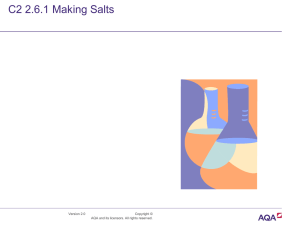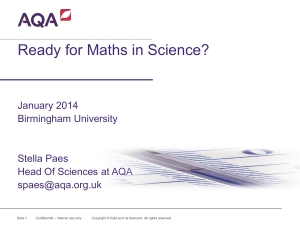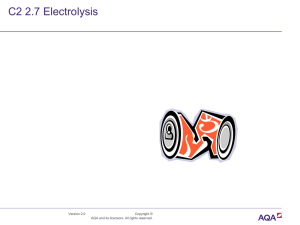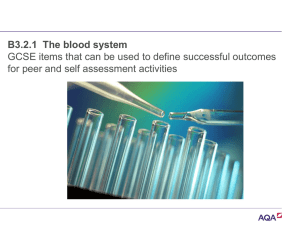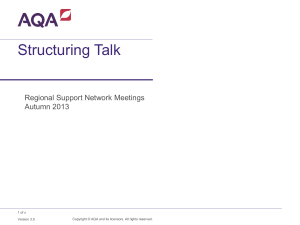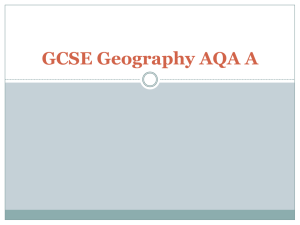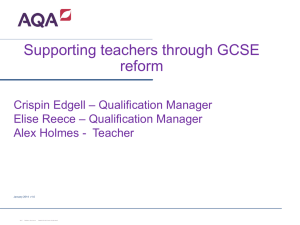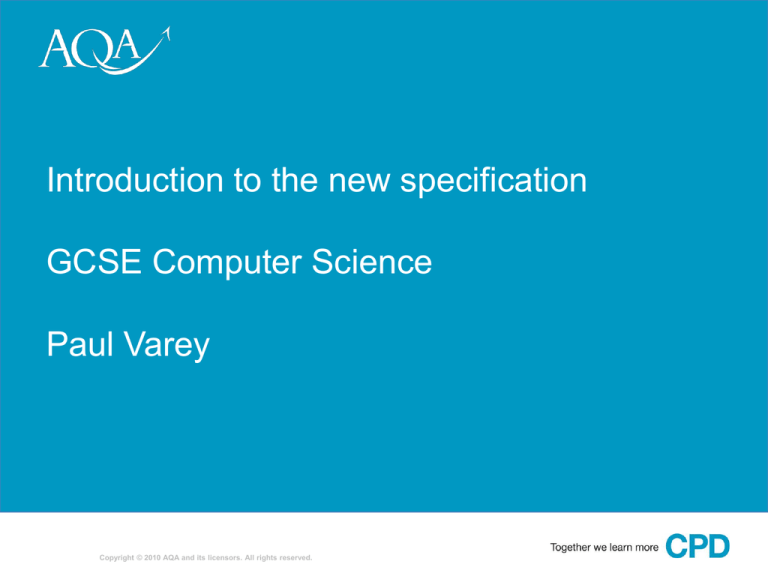
Introduction to the new specification
GCSE Computer Science
Paul Varey
1
Copyright © 2010 AQA and its licensors. All rights reserved.
Structure of the session
Introduction and overview of the new specification
• Principles and key features
• Specification at a glance
Subject content outline
Break
Assessment overview
• Controlled assessment
• External assessment
Support and resources
2
Copyright © 2010 AQA and its licensors. All rights reserved.
Meeting objectives
3
•
To understand the essential elements of the specification structure,
teaching content and assessment
•
To start thinking about the implications for teaching and learning
•
To review the resources and support available from AQA
•
To enable you to ask any questions of a senior examiner
Copyright © 2010 AQA and its licensors. All rights reserved.
Underlying principles
4
•
To provide a relevant and interesting Computer Science course
•
To support techniques and theories integral to other subjects such
as science and engineering
•
To develop knowledge and understanding of the Computing
challenges arising from rapidly changing business and social
environments
•
To enable students to appreciate how Computing is used in the real
world
•
To provide the skills to control devices rather than simply using
software created by others
Copyright © 2010 AQA and its licensors. All rights reserved.
Key features 1
•
Provides sound progression from KS3
•
Offers relevant and interesting content for study
•
Focuses on the use of mobile devices, web-related technologies
and gaming as well as more traditional programming
•
Gives centres the choice of programming language to be studied
•
Offers a choice of controlled assessment task
•
Students have the opportunity to develop team-working skills
5
Copyright © 2010 AQA and its licensors. All rights reserved.
Key features 2
•
Enables progression to A-level, vocational qualifications, industry
recognised IT courses and provides skills that are desirable in the
workplace
•
Is an alternative to GCSE ICT
•
Could be delivered alongside GCSE ICT
•
Will count toward school/college performance tables
6
Copyright © 2010 AQA and its licensors. All rights reserved.
Why choose this course?
•
Based on extensive feedback from teachers
•
Different in focus from other GCSE ICT/Computing courses
•
Has academic rigour which will be attractive to GCSE students at all
levels and their teachers
•
Takes account of industry concerns in the Computer Science field
7
Copyright © 2010 AQA and its licensors. All rights reserved.
Specification at a glance
Component 1:
Practical
programming
60% Untiered
• Submitted electronically or
on paper
Controlled
Assessment
Component 2:
Computing
fundamentals
• 126 marks - 63 marks per
task
40% Untiered
Written Paper
8
• 2 tasks of 25 hours each
Copyright © 2010 AQA and its licensors. All rights reserved.
• 84 marks
• Paper-based or on-screen
version
Subject content
9
Copyright © 2010 AQA and its licensors. All rights reserved.
Overview of the subject content
•
Computer Hardware
•
Computer Networking
•
Algorithms
•
Programming Techniques
•
Software Development Life Cycle
•
Database Concepts
10
Copyright © 2010 AQA and its licensors. All rights reserved.
Assessment
11
Copyright © 2010 AQA and its licensors. All rights reserved.
Controlled assessment Ofqual conditions
12
•
Task Setting - High level of control
AQA will set the task, but centres allowed to
contextualise
•
Task Taking - Medium level of control
Most of the work is to be done under ‘informal
supervision’ but students can carry out research at
home
•
Task Marking - Medium level of control
Centres will mark students’ tasks and this will be
moderated by AQA
Copyright © 2010 AQA and its licensors. All rights reserved.
Controlled assessment task
•
Scenario-based tasks using engaging and relevant contexts
•
Students create an appropriate software solution that meets the
needs of an end user
•
Allows students to focus on an area that interests them
•
Tasks can be contextualised
13
Copyright © 2010 AQA and its licensors. All rights reserved.
The specimen controlled assessment task
14
Copyright © 2010 AQA and its licensors. All rights reserved.
Marking criteria
Design of solution
9 marks
Solution development
9 marks
Programming techniques used
Testing and evaluation
Total
15
Copyright © 2010 AQA and its licensors. All rights reserved.
36 marks
9 marks
63 marks
The specimen question paper and mark scheme
16
Copyright © 2010 AQA and its licensors. All rights reserved.
Support and resources
17
Copyright © 2010 AQA and its licensors. All rights reserved.
AQA tools
18
•
AQA website
•
e-AQA
•
Secure Key Materials
•
ERA (Enhanced Results Analysis)
•
TOLS (Teacher Online Standardisation)
Copyright © 2010 AQA and its licensors. All rights reserved.
Support and resourcing
19
•
FREE Preparing to Teach courses
•
To offer teacher training courses
•
Developing teacher and learner resources
Copyright © 2010 AQA and its licensors. All rights reserved.
Timeline 1
Draft
Specification,
specimen
Question
Papers, Mark
Schemes and
Controlled
Assessment
Tasks
published
Accredited
specification published
FREE Introductory web
conferences
First teaching of
GCSE in
Computer
Science
FREE Preparing
to Teach courses
Controlled
assessment
advisers
allocated
Teacher and learner
resources published
February
20
March
April
Copyright © 2010 AQA and its licensors. All rights reserved.
May
June
July /
August
September 2012
Timeline 2
Teacher training courses available
Additional teacher and learner
resources published
Standardisation
meetings for the
Controlled
Assessment
component
Release of first
controlled
assessment tasks
Autumn 2012
21
Spring 2013
Copyright © 2010 AQA and its licensors. All rights reserved.
Summer 2013
Autumn 2013
Availability
Component 1
Practical
programming
Component 2
Computing
fundamentals
Certification
For GCSE
award
June 2014
June 2015
and after
100% terminal assessment
22
Copyright © 2010 AQA and its licensors. All rights reserved.
Administration summary
23
•
Start course in September 2012 for 2-year study
•
First controlled assessment moderation June 2014
- submission to AQA by 7 May
•
First exam June 2014
•
First GCSE certification June 2014
Copyright © 2010 AQA and its licensors. All rights reserved.
Where to get help
24
•
Subject Manager
ict-subjects@aqa.org.uk
0161 958 3860
•
Teacher Support Manager
teachercpd@aqa.org.uk
0161 957 3646
•
Ask AQA
•
Controlled Assessment Advisors
Copyright © 2010 AQA and its licensors. All rights reserved.
Thank you for your participation
25
Copyright © 2010 AQA and its licensors. All rights reserved.

